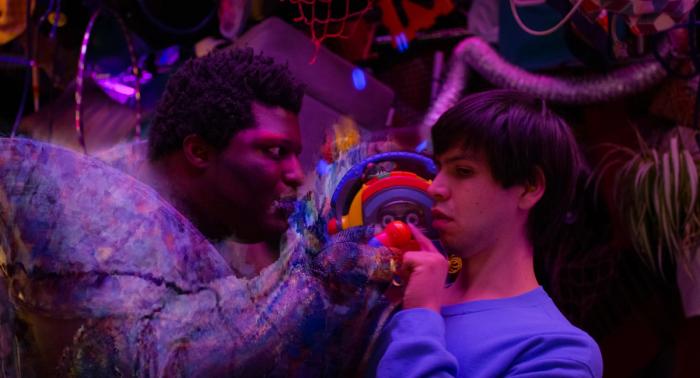Please visit response.fsu.edu for official FSU updates and resources.
Problemista Deserves to Go Far

“She’s just trying to get to that audition,” Julio Torres says about “our Queen” Anna Faris’s protagonist character in Gregg Araki's Smiley Face. This is part of his answer I asked him in a college roundtable promoting his new Dramedy and directorial debut Problemista. The question being: “In an interview with the Hollywood reporter, you referred to your film as an example of an I-Don’t-know-how-i’m-gonna-make-the-rent genre. Are there other films or narratives that come from that same vein that helped inspire Problemista?” In his answer he delves into a few films that fall into that frantic and straightforward narratives rooted in common human experiences, but what struck me the most is his admiration of Smiley Face, with how apparent of an inspiration it is on Torres’s own refreshing film. Both follow a lead with ambitious dreams for their lives while dealing with the anxiety-inducing humdrum of low-income living. Smiley Face though has been relegated to cult-classic status, ultimately an unfortunately underwatched movie. Problemista doesn’t deserve that same fate. It’s a crowd pleasing wonderful time, with a lot to say on the chaotic positive potential of Karen-dom in the service of ambition. A uniquely modern theme that Torres gets so much mileage out of in this fast-paced gem of a movie.
Torres’s admiration of the process is clear, as is his dedication to making the film not only be the fun time it ends up being, but the heartfelt journey of success under duress in the city of dreams it always was. Specifically a personal tale of the immigrant story. Torres described in the roundtable the concept of immigration as “This silent, faceless gloom”, and in the film it is very apparent with the hourglass motif. A constant fear is hanging over the broadly relatable struggles of keeping on your feet in a hard luck economy, a fear unique to the immigrant experience. One that Torres has made a point several times to clarify that he doesn’t intend to represent everyone's experience, but his own. That’s what he knows, and that honesty and personal approach to story is what in turn makes the film so relatable to others in the same position, and irresistible to empathize with to those who aren’t. In describing the film to my father, whom immigrated to the U.S from Honduras and did all he could for ages to hold on to his work visa, he laughed and felt a nostalgic connection when hearing about all the oddjobs Julio’s character Alejandro did for cash- to the point he couldn’t even find time to sleep, but still finding the time to talk to his mother back home. He laughs because it mirrors what he did to be where he is today. I find the way this film speaks to the immigrant experience endearing. Specifically not framing it in a depressing light, even with the consequence of the film being literally disappearing from the country, but still keeping up a fun tone that lends to natural moments of relief. It subconsciously humanizes not only Alejandro, but the world he lives in. While his surroundings are largely oblivious to his struggles, it’s not malicious- just the unfair product of how things are, but moments of happiness always exist. That positive outlook is important when so many systems are designed to disincentivize thinking of yourself without thinking of how the system can enable that. Torres said himself in that same roundtable, prefacing that he’s in no position to give advice, but the words still ring true for I and many other experiences of trying to get by the day-to-day, as well as emblematic of one of the themes of the film, of the difficulty of finding light before the end of the tunnel: “Be comfortable with not having all the answers right now, and if your hopefully able to, don’t let it consume you”.
What I argue makes the film so special though is the storybook approach. That in hearing him talk about it so much is how Julio Torres gravitates towards telling his stories. The film strikes a balance between the grounded situations it's meant to represent with the absurd lengths it goes with these concepts. Looking to find a sponsor is common in the immigrant experience, but not so common is your sponsor as neurotic Karen trying to keep her husband alive via cryogenic freezing (played, with no surprise, pristinely by Tilda Swinton). Besides this, Larry Owens is the biblical entity of craigslist, the chirpy fantastical soundtrack marks a distinct sound for every oddball moment in the film- like Swintons demonic eyes when talking to apple support being highlighted with a dark rising hum, and the wonderful Dorothy Vallens herself, Isabella Rosellini narrating the entire film, from prologue to bookend.
It is just such a fun movie. It should go far not only because it is a quality time with a lot to say, but because more of this kind of quirky auteurism for a film meant to warm the hearts of a crowd should be incentivized. Between my first viewing and speaking and listening to Torres talk about his film and how his first feature-length production, something he put so much thought into- and writing this piece, FSU was able to get an advance screening of the film. A good sizeable crowd had showed up and it was my first time seeing the film with people. I loved the film so much in that time it played with a bunch of college kids that know how hard it is to manage a life beyond hectic and constant obligations and responsibilities. The laughs hit harder and so does the commentary when so many people are packed in the same room to relate to it. Julio Torres made something truly special, and I’m looking forward to what he and his creative team have in store. Hearing him talk, he’s such a sincere and down to earth person that his delving into his creative process will always leave an impression on me- just as his movie had a profound impression on the crowd that saw it. I can’t recommend it enough, and I really want its success to be reflective of how great of a watch it is.
Writer: Antony Molina
Artist: Solymar Estrella



